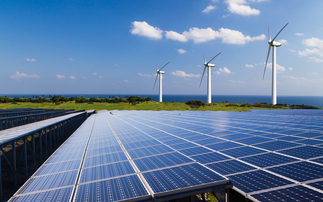Company confirms it is sourcing renewable power for all its operations globally, including in the UK where it accounts for one per cent of all electricity demand
BT Group has today chalked off a major milestone in its journey towards net zero emissions, confirming that all its network, offices, and shops worldwide are now powered with 100 per cent renewable electricity.
The communications giant confirmed it had met its 100 per cent renewables goal - which was set as part of its membership of the RE100 coalition of businesses - at a "digital impact and sustainability" briefing for analysts and investors this morning.
The company also announced that its 'Top Tips on Tech' campaign had helped 5.7 million people across the UK to learn and stay connected during the Covid-19 global pandemic.
BT is the UK's joint largest private purchaser of electricity in the UK, with its data centres and telecommunications networks a major consumer of renewable power.
As such the company has both invested directly in its own renewables projects and inked major clean energy contracts with suppliers. It said that 16 per cent of its electricity is supplied through corporate Power Purchase Agreements (PPAs) while the remainder comes from high quality green tariffs or in a small number of markets, renewable certificates.
Overall 99.9 per cent of BT's global electricity demand is directly met by renewables sources, while the remaining fraction relates to its operations in eight countries where renewable electricity is not available. As such, the company has purchased renewable certificates in a market or country interconnected to its operations or in an adjacent market or country to cover the 0.1 per cent of power sourced from non-renewable generation.
The company also said that "while challenges remain in sourcing renewable electricity in some countries, collaboration with members of the RE100 initiative is helping to make improvements in supplies".
The switch to 100 per cent renewable electricity is expected to help BT reduce its carbon emissions in the year to March 2021 by an estimated 54,000 tonnes compared to last financial year. The savings are equivalent to taking around 21,000 combustion engine vehicles off the road for a year, the firm said.
"As an organisation that consumes nearly one per cent of the UK's electricity, it is important for BT to demonstrate its commitment to a green recovery," said Cyril Pourrat, chief procurement officer at BT. "Our team has worked hard to secure renewable electricity contracts for our sites globally, a crucial step towards the Paris agreement's 1.5C target."
The milestone was welcomed by Sam Kimmins, Head of the RE100 campaign at the Climate Group. "We congratulate BT on their tremendous work to switch entirely to renewable electricity," he said. "BT was an early pioneer in setting a 100 per cent goal, and has made impressive progress. Now, by transparently sharing not only their successes but also the challenges they face in a few remaining markets, BT is helping to accelerate local solutions and unlock clean energy use around the world."
The progress on renewables represents a major boost to BT efforts to become a net zero business by 2045 and cut its carbon intensity by 87 per cent against a 2016 baseline by 2030.
And the company today also provided an update on its plans to shift its fleet to electric vehicles (EV) and deliver on a goal to switch out a third of its 27,000 combustion engine vehicles to electric by 2025.
In June, BT and its Openreach arm joined forces with the Climate Group to launch the UK Electric Fleets Coalition in order to tackle barriers to the deployment of electric fleets. The coalition now counts 27 companies as members and is calling on policymakers and manufacturers to accelerate the roll out of EVs and charging infrastructure, while pulling forward the phase out date for the sale of internal combustion engine cars and vans to 2030.
The Net Zero Leadership Hub is brought to you in partnership with BT, as part of its support for the Net Zero Leadership Stream at the world's first Net Zero Festival this autumn. All the content on the Hub is fully editorially independent unless otherwise stated.









